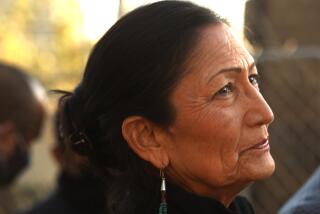Ohio Couple Granted Custody of Indian Twins
- Share via
It had the potential of setting legal history, but in the end, a dramatic battle for the custody of a playful pair of American Indian twins came to a quiet conclusion Monday with all the parties agreeing that the welfare of the children was more important than any matter of law.
Bridget and Lucy Rost, 4, whose adoption by a white Ohio couple stirred a national debate four years ago, are now in the custody of the only parents they have ever known, but they will always hold a special place among the tribe of Pomo Indians of Dry Creek.
“We are loyal to them,” said Irene Fox, a tribal administrator with the California tribe. “We are their extended family. We want them to know they are Pomo.”
In a settlement signed at the Edmund D. Edelman Childrens Court by all the parties involved, the twins will return to their home in Columbus, Ohio, with Jim and Colette Rost, the adoptive parents.
The birth parents, Rick and Cindy Adams, will have one week visitation rights every year, alternating the meeting place between Columbus and Long Beach, where the Adamses live.
The Adamses will also be able to check on the progress of the twins through regular reports and phone calls. The Rosts also agreed to seek the help of a professional to imbue the children with Native American culture.
In a last-minute addition to the stipulations, the twins were also granted membership in the Pomo tribe with all the rights and privileges.
The parties in the settlement included the two sets of parents, the adoption agency and representatives of the tribe.
“I am happy and sad at the same time,” said a sobbing Cindy Adams at a news conference after the hearing.
“They belong with [the Rosts],” Adams said as she explained that she changed her mind about the custody battle once she saw how happy the twins were with the Rosts.
“But it still hurts,” she said.
Adams’ mother-in-law initiated the custody fight using the Indian Child Welfare Act of 1978, which limits the adoption of Indian children by non-Indian parents. The legal wrangling went all the way to the U.S. Supreme Court before being sent back to the lower court. At that point, the Adamses decided not to pursue the case further.
“The law must reflect what is in the best interest of the children,” said presiding Judge John L. Henning, who thanked the parties for “rising above the law” and reaching a settlement.
After the hearing, the tearful parents and their relatives and friends hugged.
“I just feel grateful to my wife and my daughters for sticking it out,” said Jim Rost.
More to Read
Sign up for Essential California
The most important California stories and recommendations in your inbox every morning.
You may occasionally receive promotional content from the Los Angeles Times.













